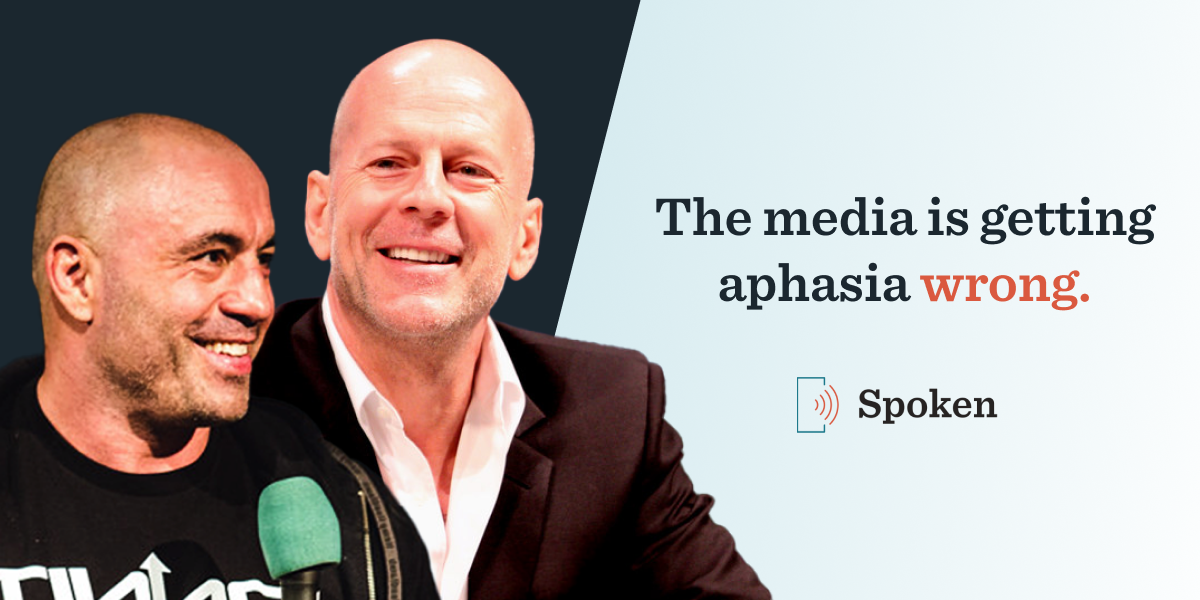How Bruce Willis' Diagnosis and Joe Rogan's Commentary Have Fueled Aphasia Misconceptions

When Bruce Willis’ aphasia diagnosis was publicly announced in Spring 2022, it sent shockwaves through the entertainment industry and beyond. The news of his condition and subsequent retirement from acting continues to fuel conversations and, regrettably, misunderstandings about aphasia. Despite the passage of time, the topic remains at the forefront of public discourse, often mired in confusion and misinformation. While the news has brought much-needed attention to aphasia, it has also led to a series of misunderstandings that need urgent clarification. This article aims to set the record straight on what aphasia is and what it is not, particularly in light of the ongoing confusion stemming from the Bruce Willis case.
Aphasia is NOT Dementia: Understanding the Difference
One of the most glaring misconceptions that emerged after the Bruce Willis announcement is the conflation of aphasia with dementia. Some news outlets have even incorrectly referred to aphasia as a “form of dementia,” which is misleading and inaccurate. Aphasia can be a symptom of dementia, but it is not a type of dementia. Unlike dementia, which affects various cognitive functions like memory and reasoning, aphasia can only affect the ability to speak, write, and understand language.
It’s also important to note that aphasia is not limited to being a symptom of dementia. It can be acquired through many other medical conditions and even injuries. For that reason, an aphasia diagnosis should not be taken as a sign of dementia or indicative of broader cognitive decline.
Importantly, while aphasia can certainly be life-changing, it is not as severe as dementia in isolated cases. Many people can and do recover from aphasia, and for those who can’t fully recover, speech therapy often helps them regain some level of communication ability. Additionally, individuals who do not regain the ability to speak can also use Augmentative and Alternative Communication (AAC) to facilitate communication.
The Media’s Role in Perpetuating Misconceptions
The media has unfortunately played a significant role in perpetuating these misconceptions. Several legitimate news sources have incorrectly portrayed aphasia as a condition that severely impacts overall cognitive function or conflated it with dementia. This misrepresentation not only stigmatizes those with aphasia but also misinforms the public about the nature of the condition.
The Danger of Pseudoscience and Uninformed Commentary
Less credible platforms have taken the misinformation to a dangerous level. Joe Rogan, on his podcast The Joe Rogan Experience, made comments that not only lack scientific basis but could also incite fear. While discussing Willis’ aphasia diagnosis, Rogan made dangerously uninformed statements like “He’s got a serious neurological condition, something’s really wrong with him” and “He’s pretty f****d up.” Rogan’s portrayal of aphasia as a perilous condition is misleading and could lead to unnecessary panic. While dealing with aphasia can be a challenging experience, many individuals with the condition continue to lead fulfilling lives. Furthermore, aphasia primarily affects language skills and does not necessarily indicate a decline in intelligence or other cognitive functions. By painting aphasia as a uniformly dire condition, Rogan is perpetuating a stigma that can be damaging to those who are newly diagnosed or managing the condition.
Rogan went on to claim that hallucinogenic mushrooms could be a cure for aphasia, citing the widely discredited—and ridiculous—Stoned Ape Theory. He also mentioned that consuming these mushrooms can grow neurons, which there is some validity to. However, there is currently no reason to believe that this would benefit people with aphasia. Given the lack of scientific backing, Rogan’s suggestion that hallucinogenic mushrooms could cure aphasia is not only uninformed but dangerously misleading. We suggest consulting a doctor or speech-language pathologist to learn about the many legitimate options for aphasic individuals.
What Can Be Done?
While the spread of misinformation about aphasia is concerning, it’s not an insurmountable problem. There are concrete steps that each of us can take to foster a more accurate understanding of the condition, both for ourselves and within our communities.
- Educate Yourself and Others: The first step in combating these misconceptions is awareness. Understanding what aphasia is and how it differs from other conditions like dementia can go a long way in dispelling myths.
- Consult Credible Sources: This may seem like a moot point when typically credible sources continue to drop the ball on aphasia information, but there are sources you can rely on for more accurate information on the subject, such as the American Speech-Language-Hearing Association (ASHA) and the National Aphasia Association.
- Be Skeptical of Unverified Claims: Before believing or sharing information—especially concerning medical conditions—it’s essential to verify the claims from multiple, credible sources. You should also talk to a certified medical professional before trying to administer any sort of remedies.
- Advocate for Accurate Reporting: If you come across a news article or other media that incorrectly portrays aphasia, consider reaching out to correct the misinformation. Your voice can make a difference.
Conclusion
The diagnosis of a high-profile individual like Bruce Willis has brought aphasia into the spotlight, but it’s crucial that this attention leads to accurate understanding rather than further confusion and fear. By educating ourselves and advocating for accurate information, we can help dispel the myths surrounding aphasia and support those who are affected by it.
About Spoken
Spoken is an app that helps people with aphasia, nonverbal autism, and other speech and language disorders.
